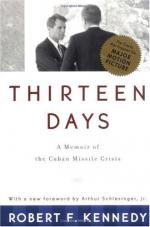
|
| Name: _________________________ | Period: ___________________ |
This test consists of 5 multiple choice questions, 5 short answer questions, and 10 short essay questions.
Multiple Choice Questions
1. Who said "we are now in an entirely new ball game" (74)?
(a) Robert Kennedy.
(b) Anderson.
(c) JFK.
(d) McNamara.
2. Who testified to Congress in 1964 that "in the first hour [of all-out nuclear war] one hundred million Americans and one hundred million Russians would be killed" (104)?
(a) Theodore Sorensen.
(b) Thomas Schelling.
(c) Robert McNamara.
(d) Dwight D. Eisenhower.
3. When JFK says, "this is the night I should go to the theater" (84), what famous historical figure is he referencing?
(a) Harry S. Truman.
(b) Abraham Lincoln.
(c) Martin Luther King Jr.
(d) Dwight D. Eisenhower.
4. Which country does Robert identify that originally doubted the U.S.'s position regarding Cuba?
(a) France.
(b) Germany.
(c) Great Britain.
(d) Brazil.
5. What did Robert promise to do with his daughters on October 28th?
(a) Attend the theater.
(b) Go shopping.
(c) Buy Halloween costumes.
(d) Go to a Horse Show.
Short Answer Questions
1. Who said, "I have participated in two wars and know that war ends when it has rolled through cities and villages, everywhere sowing death and destruction" (67)?
2. How many passengers were on the East German Passenger ship that approached the blockade?
3. What countries were supporting the U.S. and recommending that the U.S. not give in to Soviet demands?
4. During the Cuban Missile Crisis, what role did Congress play?
5. How many countries does the Secretary of State have to deal with?
Short Essay Questions
1. Who did JFK seek advice from? Why?
2. After the Soviet's agree to a stand down, JFK makes an analogy between himself and Abraham Lincoln. What does he say and what does it mean?
3. Khrushchev uses several metaphors in his letter to JFK. What is one metaphor and what does it mean?
4. How does JFK view the military advisers recommending war? Why does he feel this way?
5. What does Robert mean when he writes "no action is taken against a powerful adversary in a vacuum" (96)?
6. What did the letter received October 23rd from Khrushchev imply about the U.S. and the repercussions the U.S. may expect?
7. What made the prospect of war unbearable to JFK?
8. While still in communications with Khrushchev, RFK writes that "both 'hawks' and 'doves' sensed that our combination of limited force and diplomatic efforts had been unsuccessful" (64). What do the symbolic terms "hawks" and "doves" stand for?
9. Analyze the simile "the leaders who lived through the crisis felt what it was like to peer over the precipice" (104)?
10. Why did JFK choose the Marucla for the first vessel to be boarded?
|
This section contains 1,274 words (approx. 5 pages at 300 words per page) |

|




